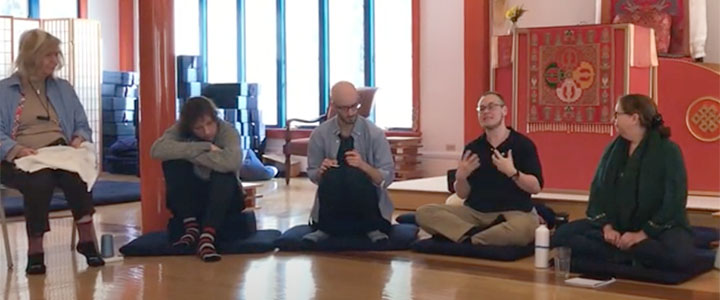Karmê Chöling is taking a fresh look at its Residency program to improve how it supports the household in practice, study and community living.
The review comes six months after welcoming the center’s first residents in August 2020, and is based on feedback from the household.
Residents are also looking ahead to how the rhythm of life might change as more people are vaccinated against the coronavirus.
Workaday Life Meets Meditation
If you’ve visited Karme Choling, you already know the program container offers a rarefied taste of community life, which can be profound and rewarding. Parallels to that can be found in Residency — with layers of complexity added by a work schedule.
The practice of Residency is not typical of conventional dharma centers, said Betsy Railla, Karme Choling’s executive director. Residents are not separating themselves from the world, but integrating meditation and community living with a workaday life.
“There are communes and other places that offer just community, without meditation,” she said. “And there are lots of other places if you’re interested in just meditation, without community. Or you can live in a more monastic setting — there’s lots of places to do that.
“What we offer is unique, which is a place where you can bring your work and your life into this container and engage in meditation and community together.”
Naturally, that brings challenges. For instance, fitting the time-honored tradition of ROTA into a life that already includes a 9 to 5 job.
“A lot of people said that they had difficulty with their schedule right away, because they had a ROTA assignment while they were still trying to figure out how to make their work life fit into our schedule,” she said.
Betsy is proposing that people who have jobs and can’t squeeze in all their ROTA be allowed to subsidize another person’s Residency by paying a bit more.
“If ROTA is crushing your schedule, and somebody else can’t afford to be here, we can figure out a way so everyone’s offering what they can offer,” said Betsy, adding that everyone will be required to join at least one dish shift per week.
Practice
The same situation applies to meditation. While KCL currently offers community sitting and protector chants at 9 a.m. and 5:30 p.m., that timing is not always conducive to everyone’s work schedule.
“So we’re learning things at lots of different levels, in terms of moral support and path support, as well as time support,” Betsy said.
There are many levels of practitioners at the center. Some follow a teacher while others are dipping a toe into the Hinayana for the first time. And there are study and practice opportunities for wherever they are on the path.
But KCL is looking at ways to better support practice, especially during the first month of Residency, and for those without a lot of experience in Buddhism or meditation.
For instance, while meditation instructors are already included in Residency, Karme Choling will schedule an appointment for you with your MI during your first month here.
When Residency began, Karme Choling asked residents to attend four meditation sessions per week. Going forward, Betsy is looking to require more daily practice for all residents, regardless of their work schedule.
“However we can make that possible, I’m there for it. If it works at 6:15 in the morning, we’re going to find a way to make that work for somebody. But meditation is a fundamental part of what we do,” she said.
Post-COVID Karme Choling
Many of Residency’s patterns have been shaped by the coronavirus. When people are vaccinated, and restrictions are lifted, Karme Choling foresees making Residency available on a one-month commitment. Karme Choling plans to make shorter stays available starting in June.
“The world is changing, again, so we’re looking at people who are vaccinated and how that will really change the restrictions we have on people living in our community and joining the community” Betsy said. “So that makes shorter stays possible. You can come for a month and see how you like it, without making a longer commitment. So we’re looking now at how we can support people who will only be here a month, so they get the most out of being here.”


 (802) 633-2384
(802) 633-2384